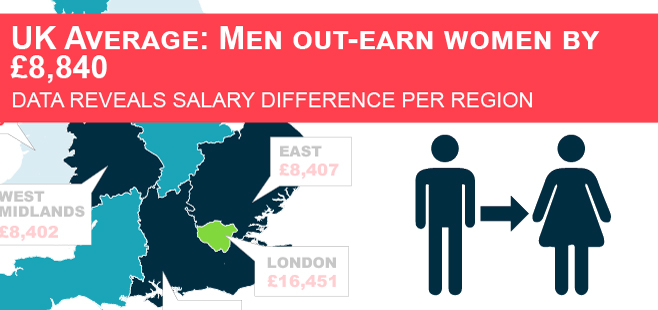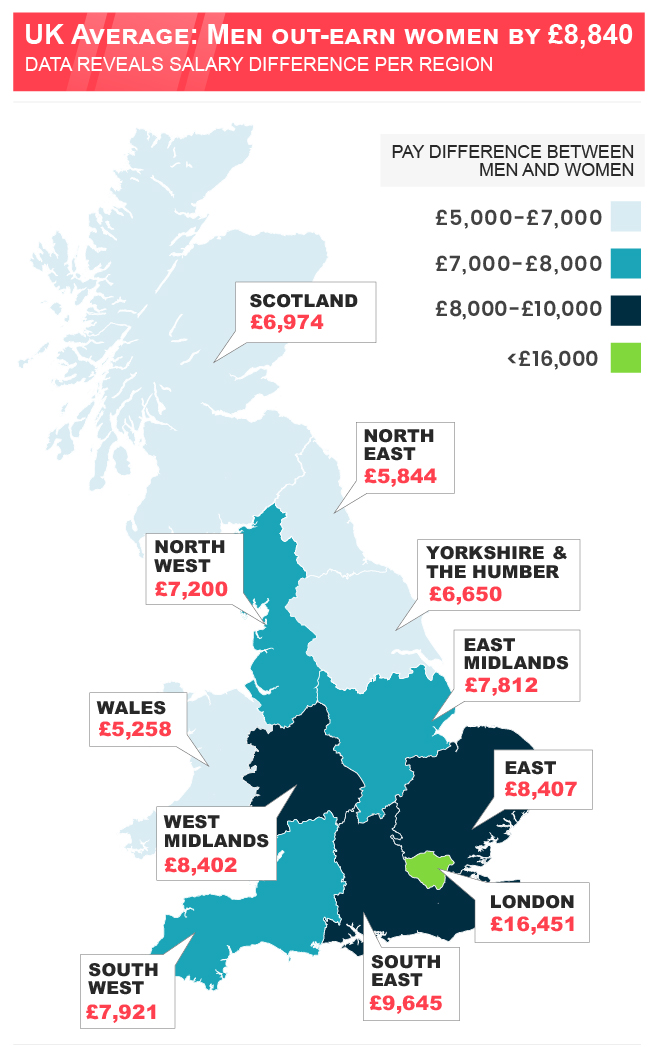BLOG
UK gender pay gap: Men out-earn women by £8,840
Sep 27 2017
Darren Best


Share this Image On Your Site
Unsurprisingly for some, London had the highest pay gap between men and women’s annual salaries. Men were paid a staggering £16,451 more than the female London salary. Figures show that the south of England had the worst difference in annual salary last year, with London, the south east and south west containing the highest salary difference in 2016. Last year, analysis by consultants Deloitte, estimated that the pay disparity will not be eradicated until 2069. PwC estimates that closing the gender pay gap would bring an £80 billion boost to overall female earnings in the UK – a £5,500 average pay rise for every working woman. Employers should also look at how many women they are promoting into the top, high-earning positions and whether they are considering a wide range of candidates when jobs come up. At present, the gap for all employees, full-time and part-time, has been decreasing, but latest figures show it was still 18.1% in 2016. This figure reflects the fact part-time workers – both men and women – earn less on average per hour than their full-time counterparts and a much higher proportion of women work part-time. Photo credit: Africa Studio/Shutterstock
According to Sam Smethers, of The Fawcett Society, a women’s rights organisation talking to The Guardian: “The impact of having children means that as men’s careers take off, women’s often stagnate or decline” – otherwise known as the motherhood pay penalty. Instead of women being penalised for having children, employers should offer benefits to help parents deal with childcare and allow returning to work and building a career a realistic option.
To eradicate this, the government introduced shared parental leave. However, this isn’t always feasible in this day and age, perhaps due to the gender pay gap itself. Equality campaigners are concerned too few families can afford for fathers to take it, as if father’s take time off work, the family income is significantly decreased.
In 2015, Prime Minister David Cameron vowed to “end the gender pay gap in a generation”. Earlier this year, the government set out new rules forcing every company that employs more than 250 people to publish the pay differences. This followed from Iceland, after it was announced that the country is to force all companies to pay all women and men equally, and receive the same salary when completing the same work. Every company with 25 or more staff members will be ordered to show that the company pays employees the same.
Photo credit: Africa Studio/Shutterstock
According to Sam Smethers, of The Fawcett Society, a women’s rights organisation talking to The Guardian: “The impact of having children means that as men’s careers take off, women’s often stagnate or decline” – otherwise known as the motherhood pay penalty. Instead of women being penalised for having children, employers should offer benefits to help parents deal with childcare and allow returning to work and building a career a realistic option.
To eradicate this, the government introduced shared parental leave. However, this isn’t always feasible in this day and age, perhaps due to the gender pay gap itself. Equality campaigners are concerned too few families can afford for fathers to take it, as if father’s take time off work, the family income is significantly decreased.
In 2015, Prime Minister David Cameron vowed to “end the gender pay gap in a generation”. Earlier this year, the government set out new rules forcing every company that employs more than 250 people to publish the pay differences. This followed from Iceland, after it was announced that the country is to force all companies to pay all women and men equally, and receive the same salary when completing the same work. Every company with 25 or more staff members will be ordered to show that the company pays employees the same.
 Photo credit: Ian Johnston/Shutterstock
No company will want to be top of the gender pay inequality rankings. But there is also an element of helping companies to help themselves. Unless they recognise the awkward truth that they have a pay gap, they won’t do anything to get rid of it.
Photo credit: Ian Johnston/Shutterstock
No company will want to be top of the gender pay inequality rankings. But there is also an element of helping companies to help themselves. Unless they recognise the awkward truth that they have a pay gap, they won’t do anything to get rid of it.
What has the government already done to reduce the Gender Pay Gap?
- Extended the right to request flexible working to all employees
- Introduced shared parental leave, so women don’t just miss out on work
- Commissioned a review to look at how we can remove the barriers preventing women from getting to the top of their careers
What’s the government doing about the Gender Pay Gap?
- Requiring large employers, including the public sector, to publish their gender pay gap and gender bonus gap
- Offering 30 hours of free childcare for working families with 3 and 4 year olds, to get women back to work quicker
- Encouraging girls to consider a wide range of careers, including in those higher paying sectors traditionally dominated by men